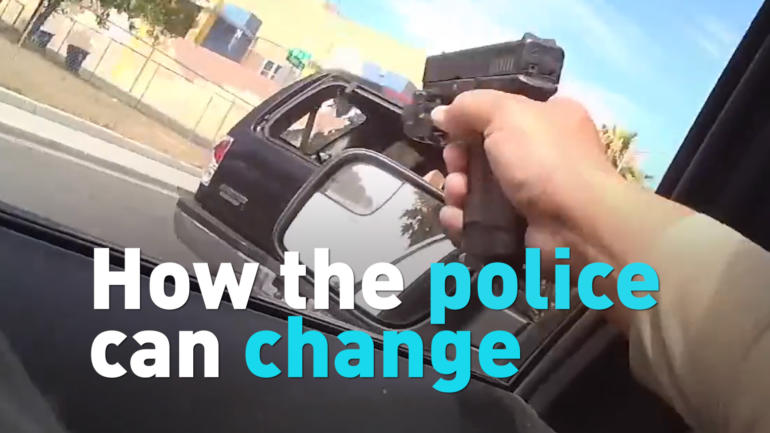Banning chokeholds and strangleholds
In the wake of the George Floyd killing two weeks ago, the city of Minneapolis has banned the use of chokeholds by police. Derek Chauvin, the former police officer charged with second-degree murder, is accused of placing a knee on Floyd’s neck for nearly nine minutes. While not a chokehold, it is not a move sanctioned by most police departments.
Since Floyd’s death, New York City, Washington D.C., Denver, Dallas, and Houston have since also banned chokeholds.
California Governor Gavin Newsom has also called for a ban on “carotid holds” such as the “lateral vascular neck restraint” which is any movement that cuts off blood to a person causing them to lose consciousness.
Limiting use of force
Activists and politicians have called for policies that outline when force by police can be used, and some have even called for the complete elimination of use of force.
Recommendations include requiring officers to exhaust all alternatives before using deadly force, requiring de-escalation of all conflict situations, and requiring officers to give a verbal warning before using deadly force.
Some also want to require officers to intervene and stop excessive force used by other officers and report such incidents and to require officers to report each time they use force or threaten to use force against civilians.
Banning shooting at moving vehicles
Shooting at a moving car can put other people at risk and can lead to an uncontrolled vehicle.
After New York City banned the practice in 1972, there was a large reduction in police shootings.
End policing of minor crimes and for-profit policing
Some call it “broken windows policing” or the enforcement of minor crimes, including sleeping in public places, marijuana possession, loitering and consuming alcohol on streets, to dissuade larger crimes.
Activists say that has led to criminalization and over-policing of people of color and poor people.
Many have also called for police departments to stop using methods that are only meant to generate profit such as fines and ticketing.
People are also calling for states to ban the practice of civil asset forfeiture.
It allows police to seize assets and money from people who are suspected of committing a crime.
These assets can be sold to add to police budgets, even if no one is convicted of a crime.
Requiring body cams and protecting public use of cell phones to record police actions
Activists say that nearly every case where a police officer was charged with a crime for killing a civilian in 2015 relied on video evidence showing the officer’s actions.
Independent prosecution and investigation
Many have called for independent and unbiased investigation and prosecution of cases in cases of police violence.
Since prosecutors rely on policy to gather evidence and also have a duty to defense police actions, many activists say this makes it impossible for them to have an unbiased view when prosecuting police.
More training and hiring people of color
In 2015, four Black parole officers were held at gunpoint by white officers in Ramapo, New York.
The police said they got a report of people wearing bulletproof vests in a car. The Black officers sued the city, and said it wouldn’t have happened if they had been white.
Many have called for police to hire more people of color.
White men are about 40% of the U.S. population, but make up about 64% of officers.
Research shows police departments with more Black officers are less likely to kill Black people. Police also need more training on how to interact with communities, activists say.
In Grand Rapids, Michigan, police stopped five unarmed Black children between the ages of 12-14 in 2017.
They said they got a report of a teenager carrying a firearm that matched the boys’ description. The incident, and the police explanation shocked the boys and their parents.
Police need more training on how to interact with communities, activists say.
The Police Executive Research Forum says police recruits spend 58 hours learning to shoot guns.
But they only spend 8 hours learning how to de-escalate situations.
More community oversight
Activists also want greater community oversight of police such as civilian review boards.
They say the community should determine what consequences police face instead of other officers.
Large police departments received 26,000 citizen complaints on use of force in 2002, the Bureau of Justice Statistics found.
Only 8% of them resulted in sufficient evidence to place disciplinary actions against officers.
Only about 20% of large police departments actually have civilian complaint review boards.
Departments with review boards had a higher rate of force complaints compared to those without, the Bureau found.
 CGTN America
CGTN America

